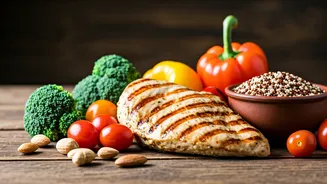Why Protein Matters
Protein forms the cornerstone of a healthy diet, especially when grains are off the table. It's the building block for all cells and essential for a variety
of bodily functions. Proteins are involved in the repair and maintenance of tissues, as well as hormone and enzyme production. A sufficient protein intake helps manage hunger, and maintains muscle mass, key elements in your health goals. It’s also crucial for keeping your energy levels stable. When grains are removed, you must ensure you consume enough protein to avoid feeling depleted or suffering from nutrient deficiencies. The best grain-free diets prioritize protein-rich options to replace the energy and nutrients provided by grains.
Lean Meat Choices
Lean meats like chicken breast, turkey, and fish are excellent sources of protein. They offer a high protein yield per serving and are relatively low in fat, making them an ideal choice during a grain-free week. Chicken breast provides around 30 grams of protein per 100-gram serving, alongside essential amino acids. Fish, particularly fatty varieties such as salmon, not only provide protein but also supply omega-3 fatty acids, important for brain health and reducing inflammation. Turkey is another strong contender, offering a similar protein profile to chicken. Consuming lean meats provides the necessary nutrients without the presence of grains. Look for ways to prepare them that are grain-free, like grilling, baking, or stir-frying with non-grain-based sauces.
Seafood for Protein
Seafood is a protein-packed option, with many varieties offering additional benefits. Salmon, tuna, cod, and shrimp are all excellent selections. Salmon is not only high in protein but also contains omega-3 fatty acids, which boost heart and brain health. Tuna provides a good amount of protein, although moderation is important due to mercury content. Cod is a lean, versatile choice that's rich in protein. Shrimp is a convenient and easily digestible source of protein that’s naturally grain-free. Including seafood in your meals can provide a diversity of nutrients and add variety. Preparing seafood involves avoiding breading or sauces that contain grains. Simple methods like steaming, baking, or grilling highlight the natural flavors of the seafood.
Eggs and Dairy
Eggs are a versatile, easily accessible protein source. They contain all essential amino acids and are rich in nutrients like choline. Eggs can be prepared in various ways, making them a suitable addition to any meal during your grain-free week. Dairy products, like Greek yogurt and cheese, also provide protein. Greek yogurt offers a significant protein boost, alongside probiotics, beneficial for gut health. Cheese contains a good protein to calorie ratio. Ensure dairy products are consumed in moderation because some people may experience digestive issues with them. They should be included in your meal planning while considering your individual tolerance. Dairy and eggs can also be used in grain-free baking, using alternative flours to create meals and treats.
Plant-Based Power
While animal products are protein-rich, there are many plant-based options available for those looking for alternatives. Lentils, chickpeas, and various beans are packed with protein and fiber, helping you feel full for longer. However, certain beans are high in carbohydrates, so portion control and careful selection are crucial to staying grain-free. Nuts and seeds, like almonds, pumpkin seeds, and chia seeds, also offer protein and essential fats. Tofu and tempeh, derived from soybeans, provide complete protein sources and can be prepared in versatile ways. Including plant-based proteins diversifies the diet and offers different nutrients. These alternatives can meet your dietary requirements during a grain-free week.
Planning Your Meals
Planning is key to a successful grain-free week. Start by creating a meal plan around your preferred protein sources. Focus on including a variety of foods to ensure you get all necessary nutrients. Prepare meals in advance to avoid quick, grain-based choices when hunger strikes. Consider the preparation methods, ensuring they remain grain-free. Always read food labels to check for hidden grain ingredients in sauces or processed foods. Stock your fridge with easy-to-grab snacks like hard-boiled eggs, nuts, or Greek yogurt. Having readily available protein sources can make the grain-free week smoother and more sustainable. This will allow for ease during meal times and help maintain consistency.
Tips for Success
Staying hydrated is extremely important during a grain-free week, as your body may shed water weight early on. Drink plenty of water throughout the day. Listen to your body and adjust your protein intake based on how you feel. Pay attention to portion sizes to maintain your calorie and macronutrient balance, especially with high-fat, high-protein foods. Prioritize whole, unprocessed foods to prevent accidental consumption of grains. Stay mindful and be prepared for potential challenges, like changes in your digestive system. Having a good understanding of suitable food choices can make the experience more comfortable. Most importantly, consult with a healthcare professional or registered dietitian for personalized advice tailored to your needs.















